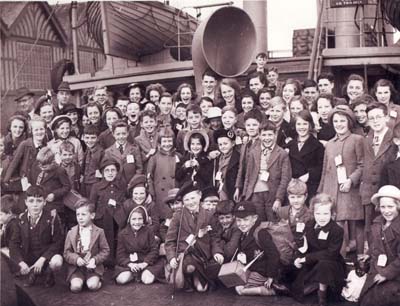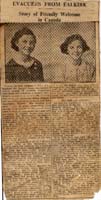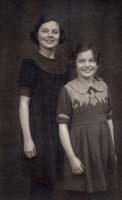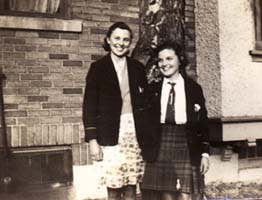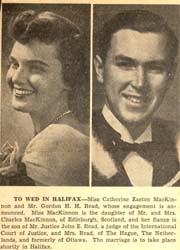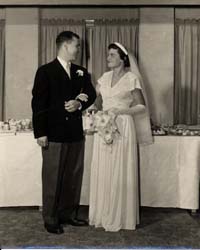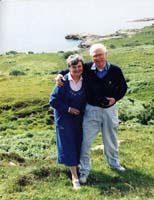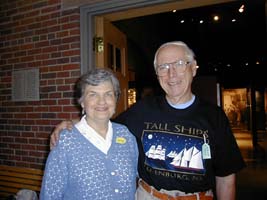Sobey Wall of Honour
Column
51
Row
12
Catherine Read nee MacKinnon
When France capitulated in June, 1940 the threat of invasion of Britain by Germany appeared to be imminent.
I vividly remember being in our neighbour's air-raid shelter in Falkirk, Scotland, when I heard a lady tearfully giving an account of recent bombings and remarking, "now the Germans can swim across the English channel and invade Britain."
In July, I heard about the C.O.R.B. for the first time. However, evacuation was never discussed in our family. In August, therefore, I was totally surprised and shocked, when my mother told my sister, Anne MacKinnon Jeffrey, and later me, that we were leaving for Canada within forty-eight hours, with other Scottish evacuees.
There was no time to analyze the situation, or consider the risk involved.
The following morning, Anne and I said good-bye to our parents and left by taxi. My favorite teacher, Margaret Chalmers, accompanied us to the railway station and that was reassuring! My reaction to being evacuated was typical of an eleven year old child who adored the American movie star, Shirley Temple, and dreamed of someday learning to sing and speak with an American accent. This was very exciting as I had not faced the reality of the situation of not knowing where we were going or how long we would be away from home.
We traveled to Glasgow by train, and we were delayed for security reasons, before going to Gourock. There was little time to become homesick as our escorts had planned some very interesting local tours.
On August 16th, we sailed down the Firth of Clyde on the S.S. Bayano. My sister recorded that she was optimistic and happy, as she regarded this as an adventure. However, as I stood on deck watching the gigantic waves, I became aware of the vast distance separating our family, as well as the danger of being at sea during the war. Standing beside me, there were five members of one family, the Baines, and I remember how concerned I was for their parents. I noticed, too, that some of the crew on the Bayano appeared to be not much older than some of the evacuees. Those boys, as well as our escorts, went out of their way to keep us happy by organizing games and concerts. The most memorable event, for me, was the wonderful birthday party given for those of us whose birthdays were in August. As there were ninety-nine children, the cake was the largest I had ever seen. It was spectacular!
The following day, we spotted an iceberg, and later, we sighted land. Then, on August 27th, we sailed up the St. Lawrence River to Quebec City. We could not sail into Halifax and Pier 21, as planned, because of the presence of many German U-Boats. The vast number of beautiful lights was a contrast to the blackouts in Scotland!
On August 28, we sailed on to Montreal where we were given a very warm reception. I recall being amazed when a Red Cross lady handed me a whole chocolate bar, and would not accept any payment. When she gave me a second treat, I thought I was in the "land of milk and honey" and was no longer afraid of the unknown.
Traveling on the night train to Toronto was a great experience. We stayed at hart House, University of Toronto until full medical procedures were completed. Red Cross, as well as Children's Aid Workers, interviewed us to gain information so that we could be placed in appropriate homes. It was great having no food rationing, and soap and shampoo were plentiful. Sleeping on mattresses on the gym floor was rather like camping.
On September 6th, we boarded a train for Ottawa, and were billeted temporarily in three different homes. In one home, the maid gave up her room, for several nights, to me. She had put her best satin sheets on her bed. I shall never forget her kindness and sensitivity. That young lady was the first colored person I had ever seen.
Finally, Anne and I were placed in the same home we were very fortunate. Like most hosts, the Malcolms had volunteered to take in pre-teen evacuees but they unselfishly accepted us, not knowing how long we would be in Canada. Their daughter, Phyllis, in grade 13 made us feel entirely welcome, and their son, Andy a grade 9 student introduced me to the neighborhood "gang". Although I was rather young for high school, I was warmly accepted and so adjustment was not too difficult. Being in Glebe Collegiate's choir, learning to ski and skate on the Rideau Canal, Ottawa, were great experiences.
C.G.I.T. camp profoundly affected my life (However, the young people were amused when I saw something while swimming, and cried out, "Oh see the wee beasties in the water!"
Anne returned to Scotland in 1944 and I left in 1945. I remember standing on board ship and hearing news vendors call out, "Les Japonais ont capitule!"
In Edinburgh, my parents were very supportive of my studying there for three years to become a teacher. In 1948, they were exceptionally understanding when I could not decide on which side of the Atlantic I should settle. They encouraged me to return to Ottawa and try teaching for a year before making the decision. However, there is a happy ending! A major event influenced my decision. When I went to board the S.S. Ascania in Liverpool, I met a Dalhousie University student returning from Europe. Three years later, in 1951, we were married in Halifax. My parents later emigrated to Canada. Now, forty-nine years later, Gordon and I have retired in Nova Scotia and have been proud to have our children and grandchildren visit Pier 21.
In retrospect, I realize that my parents were exceptional people to let us go during the vital years of our development. My host family was remarkable to share their lives with total strangers. They, and the escorts and Children's Aid Workers, in both Scotland and Canada, as well as the crew of the S.S. Bayano, have profoundly enhanced and influenced my life. I truly love, and appreciate, each one of them.
